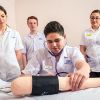
George Fisher
- Course: Healthcare Science (Cardiac Physiology) BSc
I really enjoyed learning about human biology at A level, particularly about the heart’s anatomy and structure, and love the thought of applying that to an in-demand career. It’s great to be directly involved with patients and their care from the start of the course and getting more involved in different procedures as the course progresses.
I really enjoy the balance on this course between lectures at university and being on clinical placement at hospital. It gives life at university more variation compared to attending lectures 5 days a week.
I’ve enjoyed the pathophysiology module because it has been interesting to learn about cardiovascular conditions in more detail, how they can be diagnosed and how they are managed and treated, such as cardiomyopathy and peripheral arterial disease.
I have been on placement at Dewsbury and Leeds General Infirmary, so I’ve had the experience of a small department and a large tertiary centre. I loved my time at Dewsbury and enjoyed working with a smaller team as well as working in a busy specialist environment like the LGI.
The teaching at the University of Leeds is very good, in particular with regards to learning about diagnostic testing procedures as most of the lecturers are still in practice and have a lot of experience in their specialisms.
You really get to know the cardiology lecturers very well as they teach a lot of the modules, and they get to know you too. They are very approachable and are always happy to help if you have any issues at all. You are assessed by exams, essays and presentations, which gives you a variety of assessment types and allow you to exhibit different skills which will be needed once you qualify.
I particularly like the use of the clinical skills room on our course, which allows us to practice performing ECGs and ambulatory analysis, which can really help to sharpen your proficiency as well as on placement.
The advice I would give to students considering studying cardiac physiology is to get work experience in a cardiology department so that you can see what a cardiac physiologist does, what tests they are involved in and if it is the right career for you.
The best aspects of the social life at the university is the nightlife. There’s enough here to suit anyone, from a variety of restaurants and bars to clubs that suit all music tastes and moods, so there’s always somewhere good to go after lectures.
Read more about some of our other recent cardiac physiology students.

